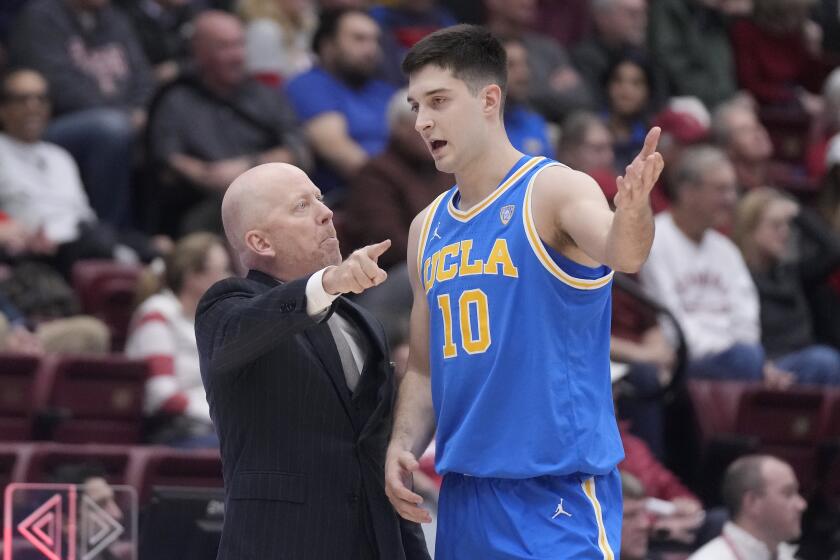PRO FOOTBALL : White Has Nothing to Apologize for After Signing with Green Bay
There have been a lot of wisecracks around the league from team officials and media about the Reggie White crusade that landed in Green Bay.
The biggest criticism of White is that he allowed money to compromise his goals of playing for a Super Bowl-caliber team and working with inner-city children through his Baptist ministry.
In other words, Reggie was a hypocrite for taking Green Bay’s four-year, $17-million offer.
We beg to differ.
What White consistently stated is that he wanted to play for an organization that was committed and capable of winning the Super Bowl.
From the day the Packers named Ron Wolf as their general manager in November 1991, they have been committed. They went 9-7 under first-year Coach Mike Holmgren last season. They have continued to upgrade their team and they are upgrading their facilities. And, what’s nice about it, they’re doing it without the idea that they have to sell tickets. They don’t.
The addition of White, plus some other players, make the Packers Super Bowl contenders this season.
Next, the money wasn’t that close in the final bidding among the Packers, San Francisco 49ers (five years, $19.58 million) and Washington Redskins (four years, $13 million).
None of the teams offered to guarantee the contract, which is understandable. White is 31 years old.
But the Packers were able and willing to structure their deal so that it was very palatable for a football player in his final years. With the Packers, White will make $9 million ($3 million in salary and $6 million in bonuses) in the first year. You try to turn that down.
The Redskins, in truth, were the team to beat, almost from start to finish. White pretty much informed Washington late in the fourth quarter of this game that if they would put $16 million on the table over four years, he would play for them.
Also, if Joe Gibbs had remained coach of the Redskins, White probably would have cut off the bidding weeks before he finally signed.
But Gibbs retired and Redskins Owner Jack Kent Cooke clearly had ideas about White’s value--$3.25 million per year was it. The Redskins also were interested in a restricted free agent, New Orleans defensive end Wayne Martin, a former No. 1 draft pick who collected 15 1/2 sacks last season.
The Redskins signed Martin, 27, to a four-year, $10-million offer sheet the day after White signed with the Packers. Martin would cost the Redskins a first-round pick, but the Saints proved last season they were not averse to matching offers. Then, they signed linebacker Pat Swilling after he received an offer sheet from the Detroit Lions.
The media also have poked fun at White because he won’t be able to help many inner-city children in Green Bay. White says he will travel to Milwaukee to accomplish his inner-city work.
The fact is, White doesn’t have to apologize for his commitment to youth because he always has put his money where his mouth is. In football, he is an older player. In life, he is a young man. He has plenty of time ahead to do his work.
If Reggie White, a good man and a great player, believes Green Bay was the best place when all the circumstances were considered, then so be it.
SOME LEAGUE officials believe the Indianapolis Colts asked for it. Others think they are being held up by the NFL. Either way, the first major arbitration case has emerged in free agency.
The Colts have been in a serious state of limbo since they offered Buffalo free-agent left tackle Will Wolford a three-year, $7.65-million contract March 29. The Bills had made Wolford a “transition” player, giving them the right to match any offer.
But Colts General Manager Jim Irsay and Wolford’s agent, Ralph Cindrich, devised some escalator clauses that, in theory, would cost the Bills more than the $2.55-million average salary because these clauses could make Wolford Buffalo’s highest-paid offensive player in the first two years of the deal.
One clause: If Wolford plays in 20% of the team’s plays, he would get a bonus between his average and that of the highest-paid offensive player. The same bonus would be paid if his club rates among the top 14 in the NFL in total offense or in the top four in the American Fooball Conference in that category, or if the team wins at least eight games.
These are labeled “incentives likely to be earned” under the new labor settlement, meaning they would have to be matched by the former club.
As a member of the Colts, however, Wolford wouldn’t necessarily get the bonus because his salary already would make him the highest-paid offensive player. In the third year of his contract, the contract would call for him to be the highest-paid “non quarterback,” clearing the way for Colts to negotiate a new deal with quarterback Jeff George.
Because the Bills have a higher-paid offensive player such as quarterback Jim Kelly ($2.864 million per year)--and with negotiations started with running back Thurman Thomas on a hefty extension--the Wolford deal could cost them (by their estimate) about $4 million per year.
The Bills protested to the NFL Management Council, which ruled in favor of Buffalo, claiming the contract did not meet the “dollar for dollar” standards in the new labor agreement governing free-agent contracts. The NFL Players Assn. sided with the Colts and Wolford.
The Colts have argued that there is no guarantee that Wolford will remain the highest-paid offensive player.
The case was scheduled for arbitration with the condition that the Bills would match the contract only if the escalator clauses were ruled invalid. The semantics of such a significant arbitration case caused a huge delay beyond the deadline of April 5 for the Bills to match or lose Wolford.
Consequently, the Colts haven’t been able to pursue other free agents, not knowing if money was available. And, there also was a question as to whether arbitration could be completed before the draft April 25 and 26.
If the Colts lose Wolford, they would be looking for an offensive lineman in the draft. If not, they may go for a running back.
Irsay hired a prominent Chicago law firm to represent the Colts and was pushing for a pre-draft arbitration.
Either way, the NFL will have a new catch phrase in free agency, surely to be known as the “Wolford Rule.”
More to Read
Go beyond the scoreboard
Get the latest on L.A.'s teams in the daily Sports Report newsletter.
You may occasionally receive promotional content from the Los Angeles Times.










